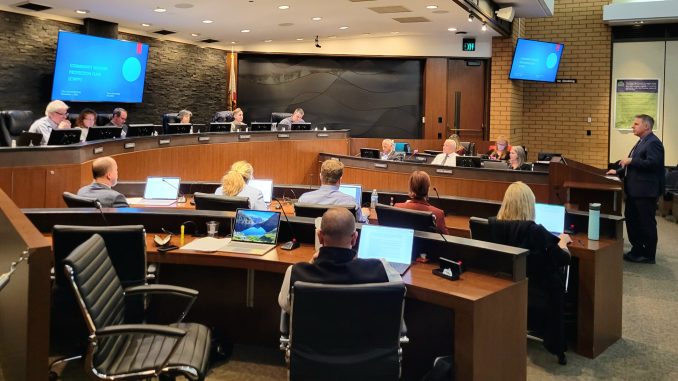
A week before Election Day, amid a battle over the balance of power in local (and national) government, the Chico City Council meeting Tuesday night (Nov. 1) attracted sparse attendance. Only a dozen citizens came to the chambers for an agenda which included Bidwell Park, wildfire safety and employee salaries.
With little to no public comment, or discussion among themselves, council members completed their business in just over an hour (two, including closed session), adopting new rules for city parks, a city-specific Community Wildfire Protection Plan and changes to building codes; confirming the employment terms for a new human resources director (Chelsea Phebus) and building official (Dale Fletcher); and approving a new contract for firefighters.
“Obviously, Chico has had its controversial decisions and things the community feels important that they’ve come and talked to us about and filled the council chambers over,” Mayor Andrew Coolidge told the CN&R afterward, expanding on a remark he made from the dais. “But two of the most pressing things that we addressed tonight—which were our park rules and how those are enforced, and also fire protection for this community—two massive issues that affect almost everybody’s life in Chico, and the room is virtually empty.
“I’m hoping that’s because they realize that those presentations were intelligent, well done, and that we have a really good plan moving forward on both of these. But, of course, I’d like the community to pay more attention to these types of aspects because they’re so important as we move forward and create a protection plan for our community that makes sense.”
Councilwoman Alex Brown, the lone progressive among six conservatives (five Tuesday, with Michael O’Brien absent), had a different take.
“Mayor Coolidge and his friends on the council are very good at patting themselves on the back,” she said by phone the next morning, “and it’s a little patronizing for a city leader to say what’s important and what’s not important to their community—and a little belittling. We, as human beings and residents of this community, get to decide when we use our voices, when we show up, when we feel something needs a push or to be uplifted.
“Mayor Coolidge may not like that people come and share opinions that he doesn’t share with the council on issues that are important to them, but if he doesn’t like it, he shouldn’t be a city leader,” Brown continued, adding: “This council seems dead set between now and the election on having the shortest and least controversial meetings possible.”
The last meeting, Oct. 18, also concluded in an hour; the previous, Oct. 4, in just over 90 minutes.
Park changes
The reconsideration of park rules stemmed from a request by Coolidge at the Feb. 15 meeting, approved unanimously, to have the Bidwell Park and Playground Commission review regulations pertaining to conduct and disturbances, along with signage. Commissioners recommended:
· Designating all city parks as drug-free zones.
· Changing the closing time for parks and greenways to 10 p.m., except at City Plaza and the Chico Community Observatory in Upper Park, where it would stay at 11 p.m.
· Reducing the speed limit for vehicles and bicycles in Lower Park from 20 mph to 15 mph.
· Providing more specific information to rangers and police on the city’s current noise codes.
· Installing the new rules signs in Bidwell Park and greenways where camping restrictions are enforceable.
Council members discussed whether to ban propane tanks and restore dusk-to-dawn closures but ultimately decided to stick to the commission’s recommendations on a 5-1 vote.
Brown dissented (her lone nay Tuesday). On the dais, she cited a lack of “data-driven decision making” on the speed reduction in particular. Park and Natural Resources Manager Linda Herman explained the city could, by law, lower the speed limit to 15 mph without a traffic study but that this survey would be done in a month. Brown questioned the change ahead of the findings, as well as the legal basis for designating parks drug-free zones, which City Attorney Vince Ewing said he could not provide without research.
“This was, once again, demonstrating zero tolerance for people experiencing homelessness very specifically,” Brown told the CN&R, elaborating on her vote. “I think this council has a very authoritarian way of looking at issues, a crackdown mindset on a lot of different things, on behavior and lifestyle and experience that doesn’t align with their traditional beliefs about what is normal or acceptable in society.
“I think these regulations, although I don’t poo-poo on all of them, are an attempt to make that statement without actually finding solutions to the problems that our community is facing.”
Fire prevention
Drafting of the Community Wildfire Protection Plan (CWPP) traces to council funding in fiscal year 2020-21 in response to fires in the North State—as Fire Chief Steve Standridge put it Tuesday, “adapting to a new normal.” Deer Creek Resources, a wildfire planning and response firm based in Chico, prepared the plan, which includes a public survey that drew 511 responses and an assessment of the city’s full wildland-urban interface.
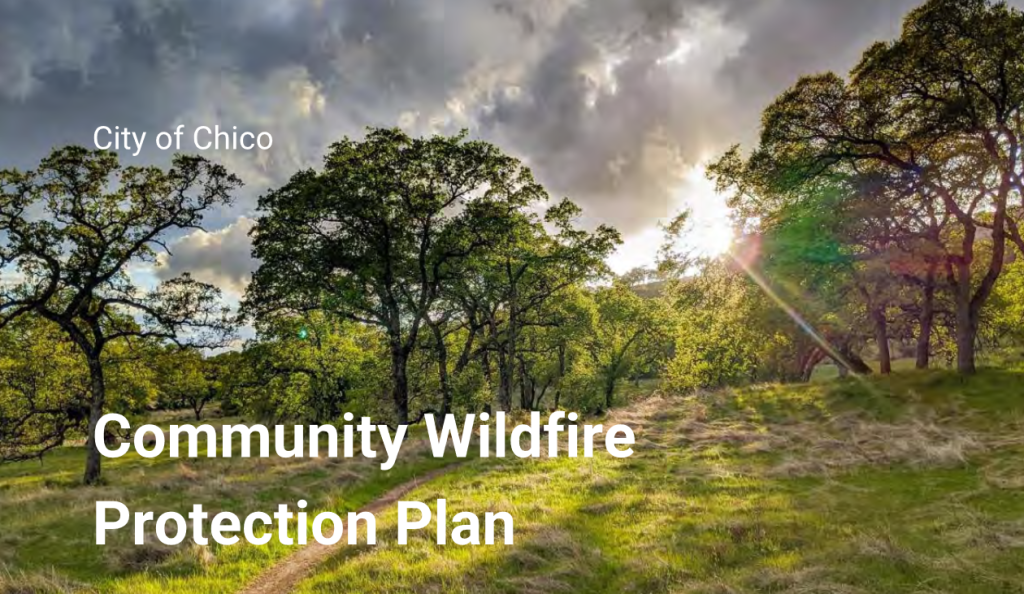
As a result, Standridge said, the city has a document including a “house-by-house, parcel-by-parcel focus” that the fire department and code enforcement officers can use to “look for opportunities to reduce fire risk.”
The CWPP, which the council approved unanimously without revision, complements the Vegetative Fuels Management Plan prepared last year for the city Parks Department. “Actionable items” include (depending on funds) education and outreach in high-risk areas; expanding prescribed burns on private land; strengthening building standards; a bridge or low-water crossing across the creek in Upper Park, and increasing water supplies for fire suppression.
“Doing the plan is one thing,” Coolidge said. “Following through through with the plan is another. The follow through has to be there. The council and future councils have to be dedicated to actually doing that, to funding that.
“But if that is done and funded the way that it should be, and to the level that it should be, that will be a huge impact to our community. It will carry us forward with fire protection as a main concern for the city of Chico and fully being addressed through that plan.”

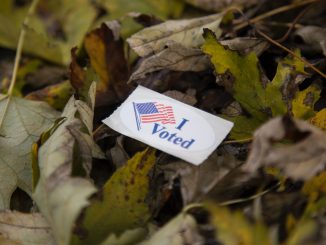
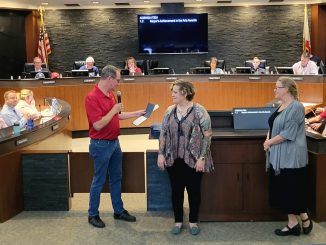
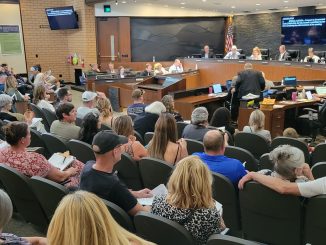
Be the first to comment